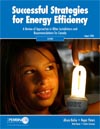Successful Strategies for Energy Efficiency
 The Pembina Institute has published a report outlining energy efficiency policies used in other jurisdictions and recommending which strategies can be applied in Canada.
The Pembina Institute has published a report outlining energy efficiency policies used in other jurisdictions and recommending which strategies can be applied in Canada. Increased energy efficiency means producing goods and services with less energy. Improving the productivity of how we consume energy provides Canadians with many direct benefits. This report highlights the key features of successful energy efficiency policies among leading US States and in the European Union. It makes recommendations on how the experiences of these jurisdictions can be applied in Canada at both the provincial and federal level.
Looking at California, New York, the Pacific Northwest, Texas, Vermont, and the United Kingdom, the authors identify successful strategies that share the following core elements:
- Leadership in making energy efficiency a priority resource in energy policy
Setting legally binding targets for energy savings (e.g., kWh or GJ saved each year). - Providing financial and institutional structures to deliver energy efficiency
- Developing comprehensive programs
- Establishing measurement and verification protocols
While energy efficiency helps save money, limit environmental degradation, and reduce uncertainty of future costs of energy services, it appears that Canada’s energy saving achievements have been decreasing, conclude the authors. Much could be accomplished by adopting, modifying and building on the successful strategies reviewed in this report. The amount of energy savings that can be realized depends on the policy designs, resources, and time devoted to energy efficiency, they add.
The full report can be found click here.
You can return to the main Market News page, or press the Back button on your browser.

